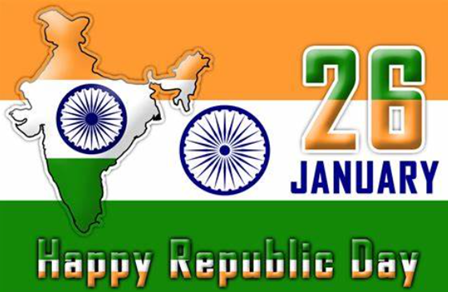India's Republic Day: A Celebration of Unity and Sovereignty
India celebrates its Republic Day every year on January 26th with immense pride and patriotic fervor. This day marks the adoption of the Constitution of India in 1950, making the country a sovereign, democratic republic. Republic Day is not just a public holiday but a tribute to India's rich heritage, diversity, and the sacrifices of countless individuals who fought for the nation's freedom and integrity.
Historical Significance
January 26th was chosen to honor the declaration of Purna Swaraj (complete independence) made by the Indian National Congress on the same date in 1930. On this day in 1950, the Constitution of India came into effect, replacing the Government of India Act (1935). It established India as a republic, signifying that the country would be governed by elected representatives and not under the rule of any monarch.
Key Celebrations Across the Country
The most prominent celebration takes place in the capital, New Delhi, where a grand Republic Day Parade is organized at Rajpath. This parade showcases India's military strength, cultural diversity, and technological advancements.
1. President's Role: The President of India, as the constitutional head, hoists the national flag and takes the salute from the marching contingents.
2. Chief Guest: Every year, a foreign dignitary is invited as the Chief Guest, symbolizing India's diplomatic ties.
3. Parade Highlights: The parade features marching contingents of the armed forces, colorful tableaux representing different states, and cultural performances by school children. The flypast by the Indian Air Force is the grand finale, leaving the audience spellbound.
The Spirit of Unity and Patriotism
Republic Day is a reminder of the values enshrined in the Indian Constitution—justice, liberty, equality, and fraternity. Across the nation, people celebrate the day with flag hoisting ceremonies, patriotic songs, and cultural events. Educational institutions and local communities organize activities like essay competitions, debates, and skits to honor the day.
The Role of the Constitution
The Constitution of India, drafted by the Constituent Assembly under the leadership of Dr. B.R. Ambedkar, is the longest written constitution in the world. It lays down the fundamental rights and duties of citizens and serves as the backbone of Indian democracy.
Conclusion
Republic Day is a day of immense pride for every Indian. It is a time to reflect on the journey of the nation and to recommit to the values of democracy, equality, and unity. As the tricolor flutters in the sky, it reminds every citizen of their responsibility toward the country and the importance of upholding the ideals that make India truly remarkable.
Let us celebrate this Republic Day with gratitude for our forefathers and a promise to work together for a brighter future for our nation. Jai Hind!

